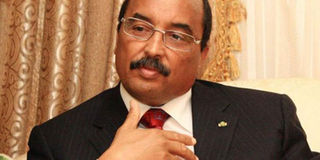Africa’s happiest and not-so-happy citizens

Mauritanian President Mohamed Ould Abdel Aziz. Mauritanian citizens are the happiest in Africa according to a recent report. PHOTO BY AFP
What you need to know:
Methodology. The results of the Wellness report are based on an estimated 146,000 interviews with adults across 145 countries and areas
Nouakchott.
Mauritania, a country in North Africa, is the continent’s happiest, a new report suggests.
According to the 2014 Gallup Healthways Survey that sheds light on the levels of prosperity and progress across the world, up to 48 per cent of Mauritanians were in love with the place they call home.
The report-a shift from the traditional parameters of wellness like GDP, and Per Capital Income-also reveals that 26 per cent of the Mauritanians interviewed were proud of the close-knit social relationships that support their lives.
The results of the Wellness report are based on an estimated 146,000 interviews with adults across 145 countries and areas.
The research was conducted from January 1, 2014, through December 31, 2014, via both telephone and face-to-face interviews.
Mauritania, whose majority of the 3.5 million population lives in urban centres, has in the past experienced ethnic tensions, pitting the Berbers against the Blacks. However, the tensions and even the number of coups in the country, have gone down.
In 2011 when north Africa and other Arab states were hit by the wave of Arab Spring revolt, Mauritania was spared together with Morocco and Algeria. Tunisia, Libya and Egypt witnessed change of guard in the dramatic revolution. The change was relief to some, but it came with challenges that the affected countries were still grappling with.
Last July, Mauritanian President Mohamed Ould Abdel Aziz, who took over power in a 2008 coup, was re-elected in a poll mostly boycotted by the opposition parties.
In terms of cash, it is Botswana, Mauritius and Algeria whose citizens were reportedly most prudent in managing their resources in a way that reduces stress levels. Countries like Ethiopia, South Africa and and Sudan, have serious issues with their cash, hence complicating their lives.
The survey of world’s state of well-being ranks Afghanistan at the bottom of class globally, with other African countries such as Cameroon, Togo and Tunisia taking last positions on the continent.
To derive the report, five factors were put into consideration: social purpose, which in this case means a liking for what they do to eke a living, financial, communal, social and physical attributes. Physical attributes capture the ability to take on tasks of life without having to strain too much.
Compared to other regions, Africa posted poor results.
Other countries at the top of the African list were Sierra Leone, Namibia, Sudan, Mauritius and Algeria in that order.
Recently, Mauritania was number 112 on the 2014 global Happiness Index, coming behind 15 other countries on the continent. That could have been as a result of some of the pressing issues that have always confronted it.
Slavery is one such. The organisation Walk Free in 2015 ranked the country on the Mediterranean Sea on top of its Global Slavery Index, saying slaves constitute a higher proportion of the population than elsewhere. The report revealed that more than 150,000 people were enslaved in the country.
Despite its mineral wealth, Mauritania remains one of the world’s poorest countries. Even recent oil discoveries and exploration have not helped much.
According to the World Bank, it is Africa’s second biggest exporter of iron ore. Mauritania is also a modest oil producer with considerable natural gas deposits and its waters have some of the most abundant fish stocks in the world.
Oddly, the Well-Being report did not rank highly big economies such as South Africa, Algeria and Egypt. Rwanda that has been a darling of many looking for investment destination on the continent, is squeezed into number 98 out of the 148 countries, behind countries such as Tanzania, Kenya and the Congo Brazzaville.
Cameroon that is currently trying to kick out the spillovers of the Boko Haram and other militias, has the worst well-being record on the continent, according to the report.
The Paul Biya-led country scored poorly on financial matters, with only 12.9 per cent reporting financial independence.
Togo also posted poor results in most of the categories.
With a small population of 6.8 million, Togo has been under the Eyadema dynasty since 1967 when the then head of the armed forces, Gnassingbe Eyadema, seized power in a coup and dissolved all political parties. Later, President Faure Gnassingbe succeeded his father in 2005.He is still in power.
WORST PERFORMERS
The survey of world’s state of well-being ranks Afghanistan at the bottom of class globally, with other African countries such as Cameroon, Togo and Tunisia taking last positions on the continent.



